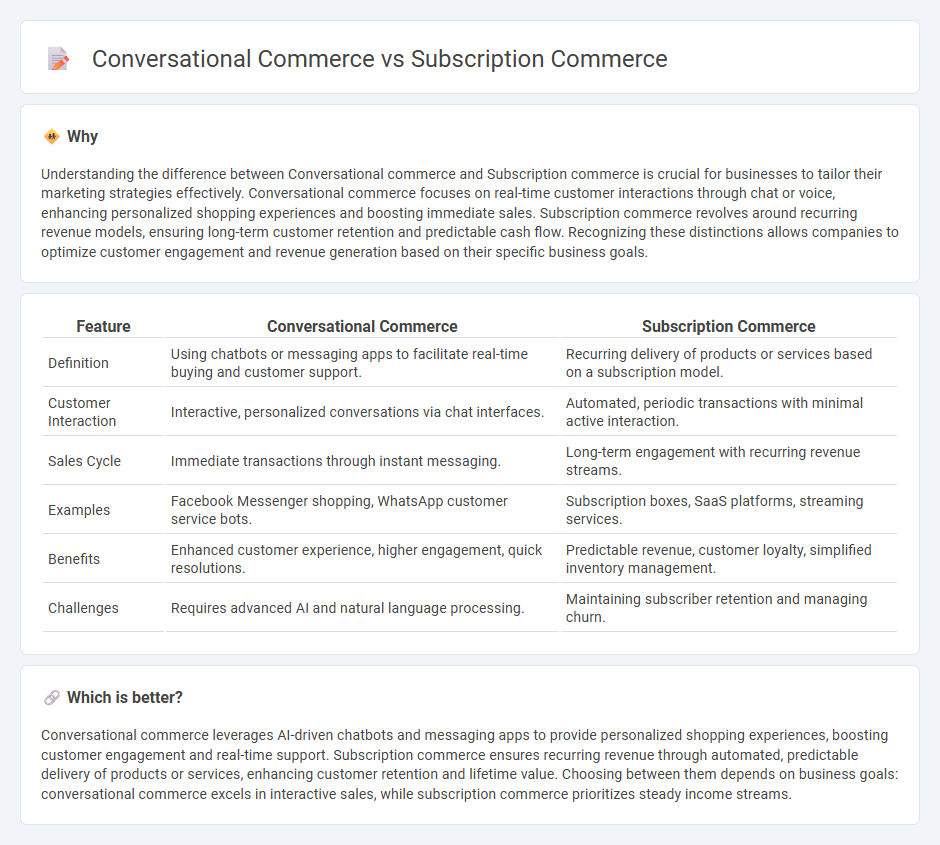
Conversational commerce leverages messaging apps and chatbots to facilitate real-time, personalized shopping experiences, enhancing customer engagement and instant support. Subscription commerce focuses on recurring delivery of products or services, ensuring convenience and customer retention through predictable revenue streams. Explore how these commerce strategies transform modern retail dynamics and customer interaction.
Why it is important
Understanding the difference between Conversational commerce and Subscription commerce is crucial for businesses to tailor their marketing strategies effectively. Conversational commerce focuses on real-time customer interactions through chat or voice, enhancing personalized shopping experiences and boosting immediate sales. Subscription commerce revolves around recurring revenue models, ensuring long-term customer retention and predictable cash flow. Recognizing these distinctions allows companies to optimize customer engagement and revenue generation based on their specific business goals.
Comparison Table
| Feature | Conversational Commerce | Subscription Commerce |
|---|---|---|
| Definition | Using chatbots or messaging apps to facilitate real-time buying and customer support. | Recurring delivery of products or services based on a subscription model. |
| Customer Interaction | Interactive, personalized conversations via chat interfaces. | Automated, periodic transactions with minimal active interaction. |
| Sales Cycle | Immediate transactions through instant messaging. | Long-term engagement with recurring revenue streams. |
| Examples | Facebook Messenger shopping, WhatsApp customer service bots. | Subscription boxes, SaaS platforms, streaming services. |
| Benefits | Enhanced customer experience, higher engagement, quick resolutions. | Predictable revenue, customer loyalty, simplified inventory management. |
| Challenges | Requires advanced AI and natural language processing. | Maintaining subscriber retention and managing churn. |
Which is better?
Conversational commerce leverages AI-driven chatbots and messaging apps to provide personalized shopping experiences, boosting customer engagement and real-time support. Subscription commerce ensures recurring revenue through automated, predictable delivery of products or services, enhancing customer retention and lifetime value. Choosing between them depends on business goals: conversational commerce excels in interactive sales, while subscription commerce prioritizes steady income streams.
Connection
Conversational commerce leverages AI-powered chatbots and messaging platforms to facilitate real-time customer interactions, enhancing personalized shopping experiences. Subscription commerce relies on recurring revenue models and customer retention strategies that benefit from conversational interfaces for seamless order management and customer support. Integrating conversational commerce within subscription services increases engagement, reduces churn, and simplifies transaction processes.
Key Terms
Recurring Payments (Subscription commerce)
Subscription commerce centers on recurring payments, enabling businesses to generate predictable revenue through automated billing for products or services delivered on a regular schedule. This model enhances customer retention by offering convenience and seamless payment experiences via credit cards, digital wallets, or direct bank debits. Explore how subscription commerce can optimize cash flow and customer lifetime value through effective recurring payment strategies.
Chatbots (Conversational commerce)
Subscription commerce automates recurring purchases, ensuring consistent customer engagement and predictable revenue streams through subscription models and automated billing systems. Conversational commerce leverages chatbots and AI-driven messaging platforms to provide personalized, real-time interactions that enhance customer experience and drive immediate sales. Explore how integrating chatbots can transform your commerce strategy by boosting customer satisfaction and conversion rates.
Customer Retention (Both)
Subscription commerce enhances customer retention by offering personalized product delivery schedules that build loyalty through consistent, predictable experiences, reducing churn rates significantly. Conversational commerce boosts retention by enabling real-time, interactive customer support and personalized shopping assistance, which strengthens engagement and satisfaction. Explore the impact of these innovative commerce models on long-term customer loyalty and retention strategies.
Source and External Links
Subscription Commerce Definition and Meaning - Recharge - Subscription commerce is a business model where businesses offer products and services on a recurring basis, providing convenience to consumers and predictable revenue to brands through recurring payments and customizable offerings.
Subscription Business Model: How and Why It Works (2025) - A subscription business model involves customers paying a recurring fee to receive products or services, popular in industries like software, streaming, and ecommerce, and valued for convenience and steady revenue.
What Is Subscription Commerce: Know Models, Benefits ... - Subscription commerce is defined by recurring payments for regular delivery of products or services with various models like curation and replenishment subscriptions, benefiting businesses with predictable revenue and consumers with personalization and convenience.
 dowidth.com
dowidth.com